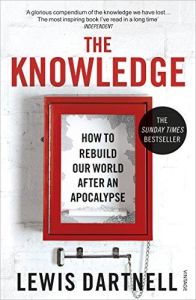
The Knowledge
How to Rebuild Our World After the Apocalypse
From THE KNOWLEDGE by Lewis Dartnell. Summarized by arrangement with Penguin Press, an imprint of Penguin Publishing Group, a division of Penguin Random House LLC
ISBN: 9781594205231
Pages: 352
Read or listen offline
Amazon KindleRecommendation
Astrobiologist Lewis Dartnell of the UK Space Agency presents an imaginative, engrossing and useful “thought experiment” exploring how people could rebuild society after its destruction. Assuming you’ll never have to use it, Dartnell’s fascinating compendium may still provoke your sense of wonder as you see how every item you wear, use or eat in daily life involves so much history and genius. If preparing for the worst is your avocation, this compendium offers an outline of everything you need to worry about and prepare for long-range. Given that Dartnell can cover only the iceberg tips, he zips through lots of material very fast. He explains so quickly what reviving some technologies will demand that unless you’re already familiar with them, you’ll hope that a supplemental manual might also survive this imaginary cataclysm. getAbstract recommends this work to those interested in history, technology, science fiction or survivalism.
Summary
About the Author
Lewis Dartnell, PhD, is a science writer and an astrobiologist. He is a professor of science communication at the University of Westminster. He has written many articles and the book Life in the Universe.
















Comment on this summary